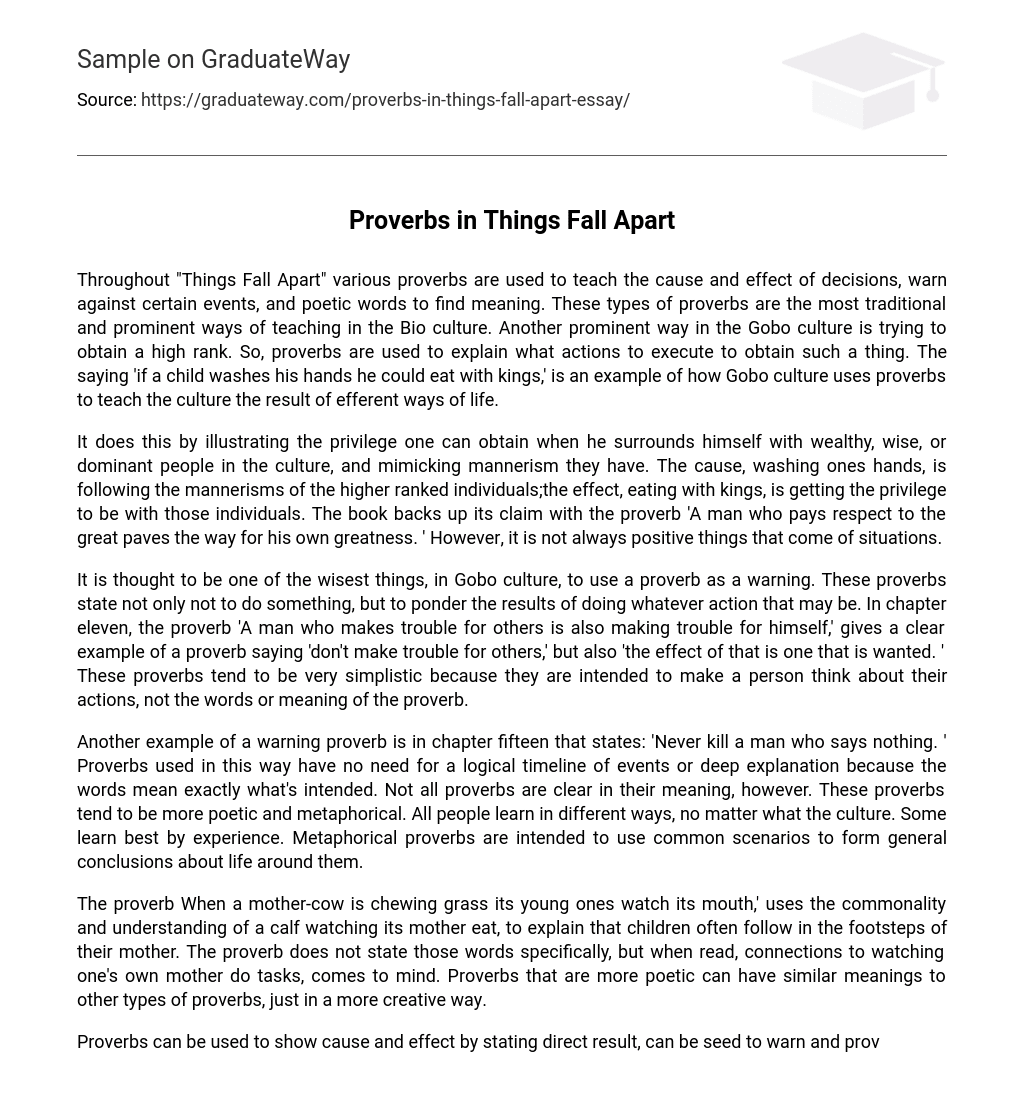Throughout “Things Fall Apart” various proverbs are used to teach the cause and effect of decisions, warn against certain events, and poetic words to find meaning. These types of proverbs are the most traditional and prominent ways of teaching in the Bio culture. Another prominent way in the Gobo culture is trying to obtain a high rank. So, proverbs are used to explain what actions to execute to obtain such a thing. The saying ‘if a child washes his hands he could eat with kings,’ is an example of how Gobo culture uses proverbs to teach the culture the result of efferent ways of life.
It does this by illustrating the privilege one can obtain when he surrounds himself with wealthy, wise, or dominant people in the culture, and mimicking mannerism they have. The cause, washing ones hands, is following the mannerisms of the higher ranked individuals;the effect, eating with kings, is getting the privilege to be with those individuals. The book backs up its claim with the proverb ‘A man who pays respect to the great paves the way for his own greatness. ‘ However, it is not always positive things that come of situations.
It is thought to be one of the wisest things, in Gobo culture, to use a proverb as a warning. These proverbs state not only not to do something, but to ponder the results of doing whatever action that may be. In chapter eleven, the proverb ‘A man who makes trouble for others is also making trouble for himself,’ gives a clear example of a proverb saying ‘don’t make trouble for others,’ but also ‘the effect of that is one that is wanted. ‘ These proverbs tend to be very simplistic because they are intended to make a person think about their actions, not the words or meaning of the proverb.
Another example of a warning proverb is in chapter fifteen that states: ‘Never kill a man who says nothing. ‘ Proverbs used in this way have no need for a logical timeline of events or deep explanation because the words mean exactly what’s intended. Not all proverbs are clear in their meaning, however. These proverbs tend to be more poetic and metaphorical. All people learn in different ways, no matter what the culture. Some learn best by experience. Metaphorical proverbs are intended to use common scenarios to form general conclusions about life around them.
The proverb When a mother-cow is chewing grass its young ones watch its mouth,’ uses the commonality and understanding of a calf watching its mother eat, to explain that children often follow in the footsteps of their mother. The proverb does not state those words specifically, but when read, connections to watching one’s own mother do tasks, comes to mind. Proverbs that are more poetic can have similar meanings to other types of proverbs, just in a more creative way.
Proverbs can be used to show cause and effect by stating direct result, can be seed to warn and provoke thought for certain actions, or be used metaphorically to encourage deeper meaning to an everyday situation. For these different reasons, proverbs are one of the most effective ways of teaching in the Gobo culture because each kind of proverb is explained various ways and supports different kinds of thinking. It is the result of the thinking that creates wisdom, wisdom that creates understanding, and understanding that makes a culture continue to grow in learn as time goes on; just like the Gobo culture.





